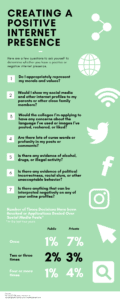Everything that you post on the internet could remain there forever, even after deleting a Facebook post it is possible the post continues to circulate across the world wide web. When using the internet, be mindful of how you present yourself.
Throughout your college application process you’re asked to demonstrate your interests, hobbies, and fit through your personal statement and supplemental essays like the “Why This College?” Essay. Sometimes, admissions officers will go the extra mile to find out what you’re all about by surfing the web.
As a high school student applying to college, it’s important that you reflect on your own internet presence and determine what it says about you. How can the kinds of things you post be perceived by someone who doesn’t know you? While most individuals believe that keeping social media profiles on private is sufficient to maintain a positive internet presence, several students were denied or rescinded admission due to information submitted by anonymous third parties. In 2017, Harvard rescinded 10 freshman offers after they reportedly made racist comments on a Facebook group. However, if your internet presence showcases your morals, values, and interests in a positive manner it’s likely they’ll determine you’re a responsible internet user.
How To Determine If You Have a Positive or Negative Internet Presence
When you begin auditing your social media accounts and Google searches, ask yourself a few key questions to determine whether you have a positive internet presence or a negative internet presence.

So, do college admissions officers really look at your social media accounts?
In short, yes. Many college admissions officers believe it is a “fair” game to examine an applicant’s social media accounts. After a quick Google search on any person, you can find out information about their beliefs, interests, hobbies, and worldview. College admissions officers will take this among other factors to determine whether you are the right fit for their school. For this reason, it is imperative that students be mindful of what kind of picture they are depicting online.
Tips for Making A Good First Impression on Social Media
-
Make your social account settings private. This is the most common way to keep your accounts but limit the viewers. Every social media outlet has an option to hide your account from the public and keep it visible to just friends or followers. Consider this option if you’re active on social media and don’t want to start from scratch.
-
Delete old messages/tweets that contain sensitive content. Remember that the college admissions process is like a job interview. You’re selling yourself. Make sure that all the information found on you is positive and professional.
-
Create new social media accounts. Sometimes your social media accounts can contain too much old and/or unprofessional content to clean up. Creating a new account and deleting that account can ease the process.
-
Professional profile pictures. Once you make your accounts private, admissions officers will still be able to see your profile picture. Make sure your profile picture is something you’d want them to see and not a picture of you and your friends at a party.
In summary, admissions officers are looking for any reason to tip the scale one way or the other. They examine thousands of applications every year and develop first impressions based on what they read about you. Give them a reason to tip the scale in your favor.
Subscribe to our blog
Don’t miss out on the latest college admissions trends, updates, and tips!



